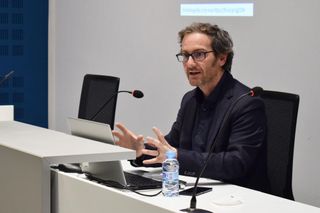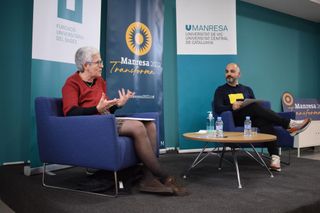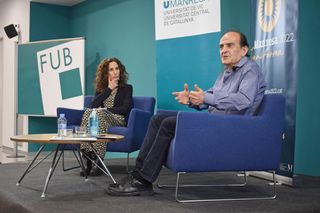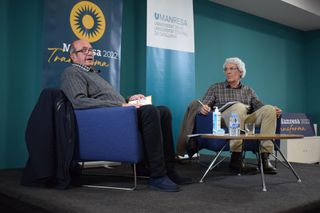- A dozen dialogues will invite reflection as a preliminary step to promote transformative actions in schools
- The dialogues and working groups should encourage the emergence of transformative ideas in education
The transformative capacity of education is the axis around which the Àgora Educació 2022 proposal revolves. It is promoted by the Bages University Foundation as the Manresa Campus of the University of Vic - Central University of Catalonia (UVic-UCC). It is part of the Manresa 2022 programme, dedicated to celebrating the five-hundredth anniversary of the arrival of Ignatius of Loyola in the capital of Bages, promoted by the City Council. The aim of d’Àgora Educació 2022 s to promote reflection, debate and commitment on the transformative aspect of the work of schoolteachers and university teaching staff.
UManresa has put its knowledge and relationships in the field of education at the service of Àgora Educació 2022 to promote reflection on what the role of schoolteachers and university teachers should be today, and on how the school should be positioned in the face of topics as diverse as philosophy, religion, language, culture, the gender perspective or new digital tools. It does this by inviting authoritative people to speak in all these areas and by encouraging the participation of teachers and the general population, whether in the debate or in the design of transformative actions.
Reflect, debate and act to bring about transformations among students, their family and social environment, and the city as a whole
The choice of topics and speakers, in the educational dialogues and in the work groups, has been made with the school in mind as an institution that interacts with the environment. Antoni Llobet, Deputy General Director of the Bages University Foundation and coordinator of the programme, explained that it has been drawn up from the conviction that the school “is not oblivious to what is happening in society and is called on to adopt a very important role to help to make it positive. Thus, the dialogues include voices from within the school environment alongside others from outside. At the same time, they combine the contribution of people from the territory itself, from the entire country and from the international dimension.”
The programme is focused on reflection, debate and action. That is why, as Llobet pointed out, “as a result of the program of dialogues and working groups, Àgora Educació 2022 wants to invite schools and institutes, and society as a whole, to carry out actions that bring about transformations for the students, their family and social environments, and the city.”
Transform through dialogue
Under the title of “Teachers who transform (themselves)”, UManresa has set up a programme of activities that includes a series of debates open to all citizens and the creation of working groups for school teachers and institutes of central Catalonia.
The educational dialogues bring together two experts on a current educational issue to present their views and start an open discussion with the audience. The intention is to be a source of ideas, and to add energy and form synergies that impact schools and institutes. The presentation of the series of dialogues took place on 18 January 2022, with the talk “Transforming (through) the school”, by the specialist in innovation and educational transformation Carlos Magro.

Experts exchange views on a topical educational issue and invite the public to join the reflection
Since January, several debates have been held in this format of dialogue between two experts. They will continue until there are twelve dialogues, throughout 2022. Participants in the programme have recognized knowledge and professional careers and include Òscar Andreu, screenwriter, presenter and director of radio and television programmes; Carme Junyent, professor of Linguistics, specialised in endangered languages, linguistic anthropology and the languages of immigration in Catalonia; Xavier López, director of the Octavio Paz School; Coral Regí, biologist and former director of the Virolai School; Clara Fons, writer and sociologist specialised in religions; Agustí Lleyda, retired teacher; Jaume Cela, teacher, writer and educator; Juli Palou, PhD in Philosophy and Education Sciences; Fathia Benhammou, director of the 360 Education Alliance; Montserrat Pedreira, director of undergraduate studies in Early Childhood Education at the Faculty of Social Sciences of Manresa at UVic-UCC; Dominica Diez, clinical psychologist, expert in psychological gambling and addictions; Rosa Vila, teacher and librarian; Irene de Puig, director of the Innovation and Research Group for the Teaching of Philosophy; Francesc Torralba, PhD in Philosophy and PhD in Theology; Eva Bach, teacher and expert in personal development, emotional intelligence and communication; Joan Soler, President of the Regulatory Council of the DO Pla de Bages; Gemma Carbó, cultural manager; Marta Esteve, director of the Carulla Foundation; Salvador Cardús, sociologist and expert in the sociology of education and national identities; Marina Subirats, sociologist, expert in sociology of education and in the sociology of women; Melina Furman, biologist and Education Consultant at UNICEF Argentina; Pepe Menéndez, lecturer and expert in leadership, educational innovation and change management; Kaleb Rashad, bachelor’s degree in Human Development and PhD in Educational Leadership; and Eduard Vallory, promoter of Escola Nova 21 - Alliance for an Advanced Education System.




Transform through collaborative work
The working groups, made up of teachers of early childhood, primary and secondary education, are currently working on the possibilities schools offer to explore areas such as community science, education beyond the classroom, the gender perspective in educational spaces, drug use during adolescence, the city and its transformation, interpersonal relationships and the creation of spaces for exploration in the stage of 0 to 3 years.
Working groups put the focus on transformation of teachers and schools in a sustainable, progressive way
Montserrat Pedreira, director of the bachelor’s degree in Early Childhood Education at the Faculty of Social Sciences at Manresa, explained that these groups are working to focus on “the transformation of teachers and schools in a sustainable, progressive way. Their approach is eminently practical, sound and thoughtful in responding to members’ needs and enjoying the leadership of experts in the chosen subject who will accompany the transformation throughout the process.”
However, Àgora Educació 2022 wants to go beyond the debate and, among its objectives, there is also the need to translate reflection into action. Therefore, the results of the educational dialogues and the teachers’ working groups must be combined to bring about transformative initiatives that will be launched from school year 2022-2023 in schools.
The intention is for these transformative educational actions to be promoted in a collaborative way between two or more centres. Cooperation should make the work richer and expand the final impact of each action. All these transformative initiatives will have the support and accompaniment of UManresa’s education studies.
A year with education at the centre
Àgora Educació 2022 joins other initiatives in the field of education promoted by UManresa this year. It is taking place at the same time as a firm commitment to expand and strengthen all activity in the field of education, whether by consolidating undergraduate, postgraduate and higher vocational training; research carried out mainly in the field of science education at an early age; services such as the science laboratory for children aged 0 to 6, Lab 0_6, which is being expanded with a space for children from 6 to 8; or the Upetita nursery school, which will be launched from next academic year.
Àgora Educació 2022 is another part of UManresa’s commitment to make useful, constructive and transformative contributions in the field of education
The FUB4 - UEducació building will house all this activity. Construction began on a modular system in July 2021 and was completed in just over nine months. The construction company handed over the keys to the facility on 9 March 2022, and it is expected that it will be fully operational from September this year, at the start of the academic year.
Manresa 2022 is the programme to which Àgora 2022 belongs. It is a strategic, cross-cutting and participatory commitment of the city to celebrate the 500th anniversary of the arrival of Saint Ignatius of Loyola in Manresa, on his way to Jerusalem on his pilgrimage. The saint spent about a year in the city and it was during this stay that he wrote Exercicis espirituals (Spiritual Exercises). During this period he also had a revealing experience, which marked his life and led him to found the Society of Jesus.